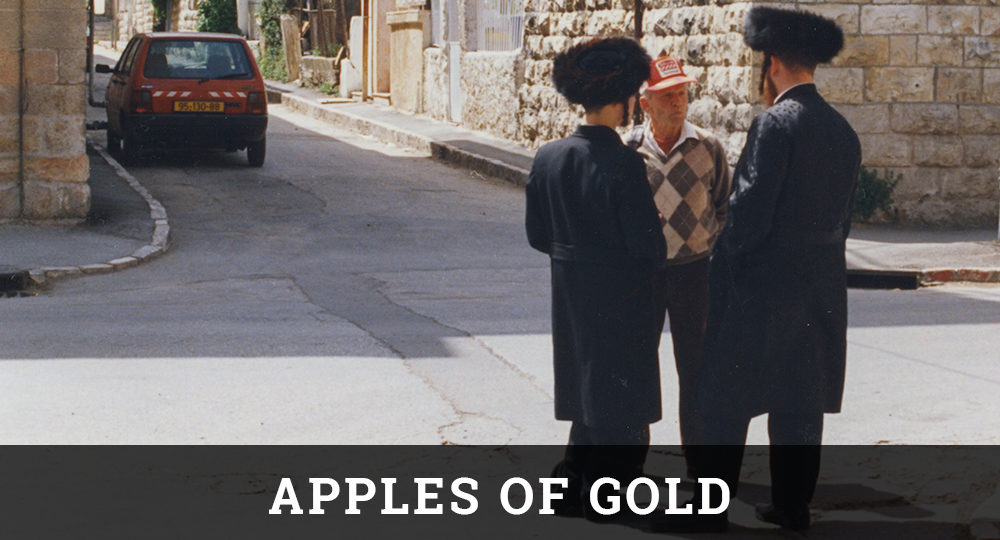Zvi Apr/May 1994
I often go to Mea Shearim, the ultra-Orthodox section of Jerusalem, because I know how deeply into sin these people have fallen, and the Word of God has charged me to warn them to come to God before it is too late.
Recently I was walking along the street in that area when I heard the voices of children singing a very old song, a song I had not heard in more than 50 years. The singing was coming from a group of students in a religious elementary school. Hearing that song, my thoughts strayed back to 1938 and the children with whom I sang it in Warsaw. Most of them are no longer alive—they perished in the Nazi death camps during the Holocaust. Yet the voices of these children sounded the same, the melody was the same, the words were the same, and the voice of the rabbi singing along with them was the same—it was as if nothing had changed.
As I stood on the street listening, I mourned for the children of my youth. They could be grandparents now, just as I am, but they are all gone, and very few of us are left who even remember them. I also felt great sorrow for the children who were singing now because it is such a woeful song. The words are taken from Psalm 44:23 and 24: “Awake, why sleepest thou, O Lord? Arise, cast us not off forever. Wherefore hidest thou thy face, and forgettest our affliction and our oppression?” Jewish children through the centuries have been taught to sing this song with a special feeling of lament, and the more I listened, the less peace I felt in my heart.
Finally I ventured into the school to speak with the rabbi. When I entered, the children all stopped singing and stared at me as if I were Tarzan in the middle of New York City. The rabbi said, “Continue singing, children!” When they finished, he approached me. He was a very old man and reminded me of a rabbi I had known as a child in Poland. He asked, “Where are you from?” and I told him that I had come in from the street because I heard the class singing. I asked, “Why are you singing a song of such deep grief and exile?” He replied, “Simply because I like it.” I then told him, “When I was the age of these children—in 1938, before the Holocaust—I sang this song many times. But I don’t sing it anymore because I have believed in God, and now I know that the Lord will never hide His face from me. Of course, we have all hidden our faces from God, and then when he does not answer our prayers we think it is His fault. But no! The fault is ours. God is merciful, and people can come close to Him by following what is written in Psalm 50:15; ‘call upon me in the day of trouble; I will deliver thee, and thou shalt glorify me.’ Since the time I believed in the Lord I no longer have to ask Him ‘Why do you hide your face from me and forget me?’” I continued to read from the Psalms, praising God with joy in my heart. I explained that I am free to ask the Lord to forgive my iniquities and that He is always ready to do this.
As I spoke with the rabbi, the children were sitting quietly, listening to our conversation. Watching them brought another Scripture passage to my mind, and I read it to them: “Unto thee, O Lᴏʀᴅ, do I lift up my soul … Remember not the sins of my youth” (Ps. 25:1, 7).
At this point the rabbi asked the children, “What do you think? Should we continue our lesson or listen to what this man has to say?” There were about 40 children in the class, all boys with long side curls. A few years ago I had an opportunity to speak in an Orthodox school for girls, but in this school for boys I felt as if I were in the lions’ den. I silently prayed in my heart, “O Lord, guide me, give me the words to say.” At the same time the rabbi called several other rabbis, all teachers, into the lecture hall.
I then began to speak to them, first telling them about myself—my life in Poland before the war, my experiences during the Holocaust, how I lost my entire family in the Warsaw Ghetto, my arrival in Israel, and my participation in all the wars through 1973. I went slowly, step by step, right up to the present time. Then I began to tell them about my faith. Of course, I could not start by declaring that I believe in Jesus Christ. I wanted them to mention His name first. I quoted several passages from Isaiah, Micah, and other prophets about the Messiah, all the while waiting for the outcry, the outburst of temper, the threatenings when they realized I was speaking about Jesus. I did not have to wait long. One of the teachers quickly asked, “What books have you read?” I responded, “Do you see what I have in my hand? It is the Holy Bible, the book I love best and the only one I use. Is it a sin to love God’s Word?”
I continued to speak for about 35 minutes, and everyone—students and teachers alike—listened carefully. When I finished they began to ask questions. “Why did you come here?” one of the students wanted to know. “Because of the sad song you were singing,” I replied. “I felt sorry for you, and I wanted you to be able to rejoice with me in the Lord. The Jewish people have lamented long enough. The time has come to turn to the Lord, the one true God, and ask for His help. As I told you before, it is written in Psalm 50:15, ‘call upon me in the day of trouble; I will deliver thee, and thou shalt glorify me.’ If you call upon Him, you can say with Isaiah, ‘we will be glad and rejoice in his salvation’ (Isa. 25:9).” When the rabbis heard this, they looked at each other in silence. It was as if someone had tied them up and put glue on their lips.
Shortly thereafter I left the school with a very good feeling. I believe that many of the ones I spoke to—students and teachers—were seriously considering the things I told them about the Lord. I trust that they will read the Bible passages for themselves and see that the Lord alone can bring them out of sorrow and into joy and peace if they will only trust Him as their Messiah and Savior.








